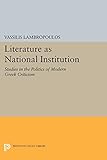Literature as National Institution : Studies in the Politics of Modern Greek Criticism / Vassilis Lambropoulos.
Material type: TextSeries: Princeton Legacy Library ; 897Publisher: Princeton, NJ : Princeton University Press, [2014]Copyright date: ©1988Edition: Course BookDescription: 1 online resource (272 p.)Content type:
TextSeries: Princeton Legacy Library ; 897Publisher: Princeton, NJ : Princeton University Press, [2014]Copyright date: ©1988Edition: Course BookDescription: 1 online resource (272 p.)Content type: - 9780691602943
- 9781400859351
- Criticism -- Political aspects
- Greek literature, Modern -- History and criticism -- 19th century
- Greek literature, Modern -- History and criticism -- 20th century
- Greek literature, Modern -- 19th century -- History and criticism
- Greek literature, Modern -- 20th century -- History and criticism
- LITERARY CRITICISM / European / General
- 889.09 19
- PA5215
- online - DeGruyter
- Issued also in print.
| Item type | Current library | Call number | URL | Status | Notes | Barcode | |
|---|---|---|---|---|---|---|---|
 eBook
eBook
|
Biblioteca "Angelicum" Pont. Univ. S.Tommaso d'Aquino Nuvola online | online - DeGruyter (Browse shelf(Opens below)) | Online access | Not for loan (Accesso limitato) | Accesso per gli utenti autorizzati / Access for authorized users | (dgr)9781400859351 |
Frontmatter -- Contents -- Acknowledgments -- Introduction -- 1. Toward a Genealogy of "Literature": The Institutionalization of Tradition in C. Th. Dimaras's A History of Modern Greek Literature -- 2. Who has been Reading Masterpieces on Our Behalf? George Seferis, Makriyannis, and the Literary Canon -- 3. The Fictions of Criticism: The "Prolegomena" of Iakovos Polylas as Künstlerroman -- 4. Incompleteness as Damnation: The Poetics of the Romantic Fragment in Dionysios Solomos's The Free Besieged -- 5. The Hermeneutics of Openness in the Novel: The Unsettling Modernism of Yannis Beratis's Whirlwind -- 6. Writing Greek as the Only Language: The Impossible Postmodernism of Renos Apostolidis's "The John of my Life" -- 7. What Makes Good Literature Good and Literature: The Politics of Evaluation Surrounding the Work of Yannis Ritsos -- 8. The Violent Power of Knowledge: The Struggle of Critical Discourses for Domination over Constantine P. Cavafy's "Young Men of Sidon, A.D. 400" -- 9. Encountering the Poststructuralist Challenge, or Beyond Humanism: The Paradigms of Contemporary Greek Criticism and the Languages of Theory -- Postscript: Peri Hermeneias -- Bibliography -- Index -- Backmatter
restricted access online access with authorization star
http://purl.org/coar/access_right/c_16ec
This book examines how the practices of criticism establish a particular domain of knowledge, the truth of literature. As a discussion of the ideology and politics of literary knowledge, it concentrates on constitutive elements of its production: the intertextuality of writing, the mediatedness of understanding, the formative role of reading expectations, the enabling presence of relevant literacy, the conditioning horizon of expectations, and the economic character of axiology. The main argument advanced is that criticism, by constructing literature as an ethnic heritage and communal treasure, participated in the invention of a national identity necessary for the legitimization of the modern state.Case studies have been selected from the highly relevant area of contemporary Greek criticism. Microscopic investigations of its dominant sites, mechanisms, and discourses reveal that the field emerged in response to concrete political needs and provided the state with a literary tradition as proof of its national composition, purity, continuity, and autonomy. The construction and canonization of texts as art works invariably employed, as a measure of aesthetic (and ultimately moral) merit, the Greekness of the literary sign. The book, as a genealogical approach to the neglected national role of literature, should be of interest to specialists in literary theory, comparative literature, Greek studies, and cultural studies.Originally published in 1988.The Princeton Legacy Library uses the latest print-on-demand technology to again make available previously out-of-print books from the distinguished backlist of Princeton University Press. These editions preserve the original texts of these important books while presenting them in durable paperback and hardcover editions. The goal of the Princeton Legacy Library is to vastly increase access to the rich scholarly heritage found in the thousands of books published by Princeton University Press since its founding in 1905.
Issued also in print.
Mode of access: Internet via World Wide Web.
In English.
Description based on online resource; title from PDF title page (publisher's Web site, viewed 30. Aug 2021)


